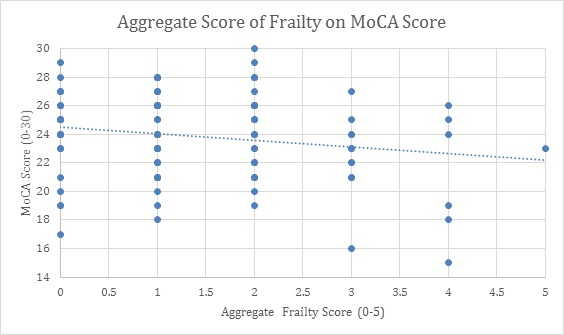Prevalence of Frailty and Cognitive Impairment at Time of Kidney Transplant Evaluation
J. Klein, A. Jurgensen, M. Gupta, N. Herrera, A. Gupta, D. Cibrik
Internal Medicine, Division of Nephrology, University of Kansas Medical Center, Kansas City, KS
Meeting: 2020 American Transplant Congress
Abstract number: C-101
Keywords: Kidney transplantation, Morbidity, Psychosocial, Waiting lists
Session Information
Session Name: Poster Session C: Kidney Psychosocial
Session Type: Poster Session
Date: Saturday, May 30, 2020
Session Time: 3:15pm-4:00pm
 Presentation Time: 3:30pm-4:00pm
Presentation Time: 3:30pm-4:00pm
Location: Virtual
*Purpose: Frailty is highly prevalent in kidney disease, with prevalence estimates as high as 73% in patients at the time of dialysis initiation compared to 7% in the general population. Approximately 20% of patients at the time of kidney transplant (KT) are frail, and this construct is associated with poor outcomes after KT. Despite high prevalence, frailty is not routinely measured at the time of initial kidney transplant evaluation (KTE). Thus, the prevalence of frailty in patients referred for KTE is unknown. Further, it is unknown whether frailty impacts cognitive impairment in this population. We measure the prevalence of frailty as assessed by Fried frailty score in patients referred for KTE. We also measure cognitive impairment at the time of KTE as another known predictor of poor patient outcomes after kidney transplant and the correlation of these measures.
*Methods: We conducted a single-center observational study to measure the prevalence of frailty and cognitive impairment at the time of KTE. Fried frailty testing was administered at the time of KTE to all patients who were referred to our transplant center for kidney transplant alone. Patients who were being evaluated for combined organ transplant or unable to complete the frailty testing were excluded. The construct of frailty has been operationalized and validated in KT as a composite of poor physical function, exhaustion, low physical activity, and weight loss. Frailty was defined if >2 criteria were present with maximum score of 5. Montreal Cognitive Assessment (MOCA) testing was also completed with cognitive impairment defined as score <26. Patient demographics were obtained. Correlation statistics were performed for frailty determination and aggregate frailty scoring versus cognitive impairment.
*Results: We enrolled 125 patients at the time of kidney transplant evaluation. 62.4% were male, 62% were Caucasian, and 24% were African American. Of the 125 patients, 54 (43.2%) were frail. Within the frail cohort, 50% were male and 39% were Caucasian. MOCA testing was completed in 111/125 patients and 74/111 (66.7%) had cognitive impairment (MOCA<26). Of the 74 patients with MOCA<26, 32 were also identified as frail. The aggregate frailty score correlation versus MOCA score was 0.182 (p= 0.054) [shown in Table 1].
*Conclusions: Frailty is highly prevalent in patients at the time of kidney transplant evaluation and correlates with cognitive impairment. Frailty and cognitive impairment commonly coexist in patients presenting for kidney transplant evaluation.
To cite this abstract in AMA style:
Klein J, Jurgensen A, Gupta M, Herrera N, Gupta A, Cibrik D. Prevalence of Frailty and Cognitive Impairment at Time of Kidney Transplant Evaluation [abstract]. Am J Transplant. 2020; 20 (suppl 3). https://atcmeetingabstracts.com/abstract/prevalence-of-frailty-and-cognitive-impairment-at-time-of-kidney-transplant-evaluation/. Accessed July 2, 2025.« Back to 2020 American Transplant Congress

